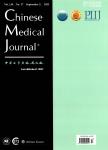IMMUNOHISTOCHEMICAL STUDY OF HNK-1 (LEU-7) ANTIGEN IN PROSTATE CANCER AND ITS CLINICAL SIGNIFICANCE
IMMUNOHISTOCHEMICAL STUDY OF HNK-1 (LEU-7) ANTIGEN IN PROSTATE CANCER AND ITS CLINICAL SIGNIFICANCE作者机构:Department of Urology the First Affiliated Hospital. Hubei Medical University. Wuhan 430060 Department of Urology. Shiga University of Medical Science. Otsu City. Japan
出 版 物:《中华医学杂志(英文版)》 (Chinese Medical Journal)
年 卷 期:1995年第7期
页 面:38-43页
核心收录:
学科分类:1002[医学-临床医学] 100214[医学-肿瘤学] 10[医学]
主 题:ANTIGEN IN PROSTATE CANCER AND ITS CLINICAL SIGNIFICANCE IMMUNOHISTOCHEMICAL STUDY OF HNK-1 LEU-7 than rate 口口 In BPH TURP
摘 要:Anti-HNK-1 monoclonal antibody (MAb) was reactive with non-cancerous and cancerous prostatic epithelia, as well as natural killer cells, mvelinated nerves and cells from. APUD systems. The expression of HNK-1 antigen on prostate cancer was investigated immunohistochemically by avidinbiotin-peroxidase complex (ABC) method with anti-HNK-1 MAb to clarify the relationship between anti-HNK-1 immunostaining of the cancerous tissue and the tumor differentiation. and that between the former and the survival rate of patients. Of 52 patients with prostate cancer, 49 were reactive with anti-HNK-1 MAb, the positive rate being 94%. The well differentiated cancer showed the highest percentage of positive cancer cells and the strongest staining, while the poorly differentiated cancer had the lowest percentage of positive cancer cells and the weakest staining. HNK-1 antigen was highly expressed on prostate cancer, and the better differentiated the cancer, the more HNK-1 antigen expressed. We also analyzed the total 5-ye



